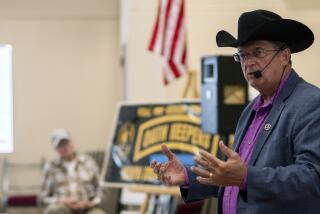West Bank Oktoberfest raises a glass to Palestinian culture
Maybe it’s the afternoon beer-chugging contest in a land where 98% of the people are Muslim and prohibited from drinking alcohol.
Or the fact that pork-filled German bratwurst and stein-carrying beer maidens have been replaced by roasted lamb gyros and AK-47-carrying policemen.
Then there’s the eclectic crowd, including Boy Scouts, nuns, foreign diplomats and even a few liberal-minded Jewish Israelis, who celebrated with thousands of other partygoers, technically violating the military ban against Israelis entering Palestinian towns.
Whatever the case, Taybeh’s sixth annual Oktoberfest over the weekend was a rather surreal affair designed to showcase the best of the West Bank, if not the wurst. “When you’re in Taybeh,” said Oktoberfest organizer Maria Khoury, “you understand God’s sense of humor.”
Taybeh Brewing Co., a family-owned beer maker that sponsors the increasingly popular party, says the point is to promote Palestinian culture and commerce amid the Israeli occupation, to draw attention to the Palestinian Christian minority and to, well, get a little toasted.
“Taste the Revolution” is the company’s slogan.
The Palestinian American Khoury family left Boston and returned to its native village in the 1990s, during the flurry of optimism about the West Bank’s expected rebirth after the 1993 Oslo peace accords. But not long after the Khourys opened their microbrewery, the second Palestinian uprising broke out in 2000, leading to the reoccupation by Israel’s military.
Amid checkpoints, electricity shortages, water rationing and Israel’s border restrictions, Taybeh Brewing lost more than half its sales in Israel. Today, Israel, which once accounted for 70% of the brewery’s business, offers Taybeh beer only in a few Tel Aviv bars and East Jerusalem hotels.
Unlike many other Palestinian businesses crippled by the intifada and its aftermath, the Khoury family persevered. Staying open “is the true peaceful resistance to the occupation,” said Daoud Khoury, brewery co-founder and current mayor of Taybeh, one of the West Bank’s few remaining Christian-dominated cities. Tucked into the hills of the West Bank’s highest region, just east of Ramallah, the brewery churns out about 160,000 gallons a year, adhering to 16th century German purity laws.
With its Israeli market eviscerated, the company focused on the West Bank, which was a hard sell considering it’s illegal to even advertise liquor in the Palestinian territories. Last year, the brewery launched a nonalcoholic beer, which is starting to catch on. But even the spirited version is rising in popularity in the West Bank, accounting for the bulk of its sales.
As it turns out, brewery head Nadim Khoury said with a smile, “people still like things that are prohibited.”
Though promoted as a kind of thumb-nosing at Israel and booster for Palestinian patriotism, the festival is also a way to raise awareness about Palestinian Christians, whose numbers in the West Bank and Gaza Strip have dwindled over the years to about 50,000.
The population of Taybeh dropped from 15,000 to about 2,000 in recent decades as residents left in search of safer, more prosperous lives in the U.S. and other countries.
At times, Palestinian Christians have also faced harassment from the Muslim majority. Churches have been burned in Gaza. On the eve of last year’s Oktoberfest, someone threw a Molotov cocktail at the mayor’s empty car. No arrests were made, but many in Taybeh suspected Muslim extremists were behind the attack.
“This event is a way of promoting our culture and reminding everyone that we are all Palestinians,” said Issa Habesh, a Christian print shop owner from Jerusalem. “People sometimes take it for granted that all Arabs are Muslim. But there were Christian Palestinians before there were Muslim Palestinians.”
He noted that Jesus is said to have passed through Taybeh, leaving converts in his wake.
Subtle Muslim-Christian tensions were apparent Saturday during the festival’s opening ceremony. The mayor spoke of the need for a “moderate Palestine.” Later, the regional governor, a Muslim woman wearing a head scarf, invited Oktoberfest attendees to enjoy the locally made products, such as olive oil and spices. But she couldn’t bring herself to mention the beer.
Generally, however, the mood was one of partying, not politics, with performances by Sri Lankan dancers, Brazilian singers and a couple of West Bank hip-hop bands.
“Palestinians have too many things to mourn about,” said Ibrahim Matar, an economist from Jerusalem who is Christian, raising a cold draft in one hand. “It’s good to just celebrate for a day.”
Nadim Khoury agreed. “We don’t have a country,” he said. “But we have our own beer.”
edmund.sanders@latimes.com
More to Read
Sign up for Essential California
The most important California stories and recommendations in your inbox every morning.
You may occasionally receive promotional content from the Los Angeles Times.










